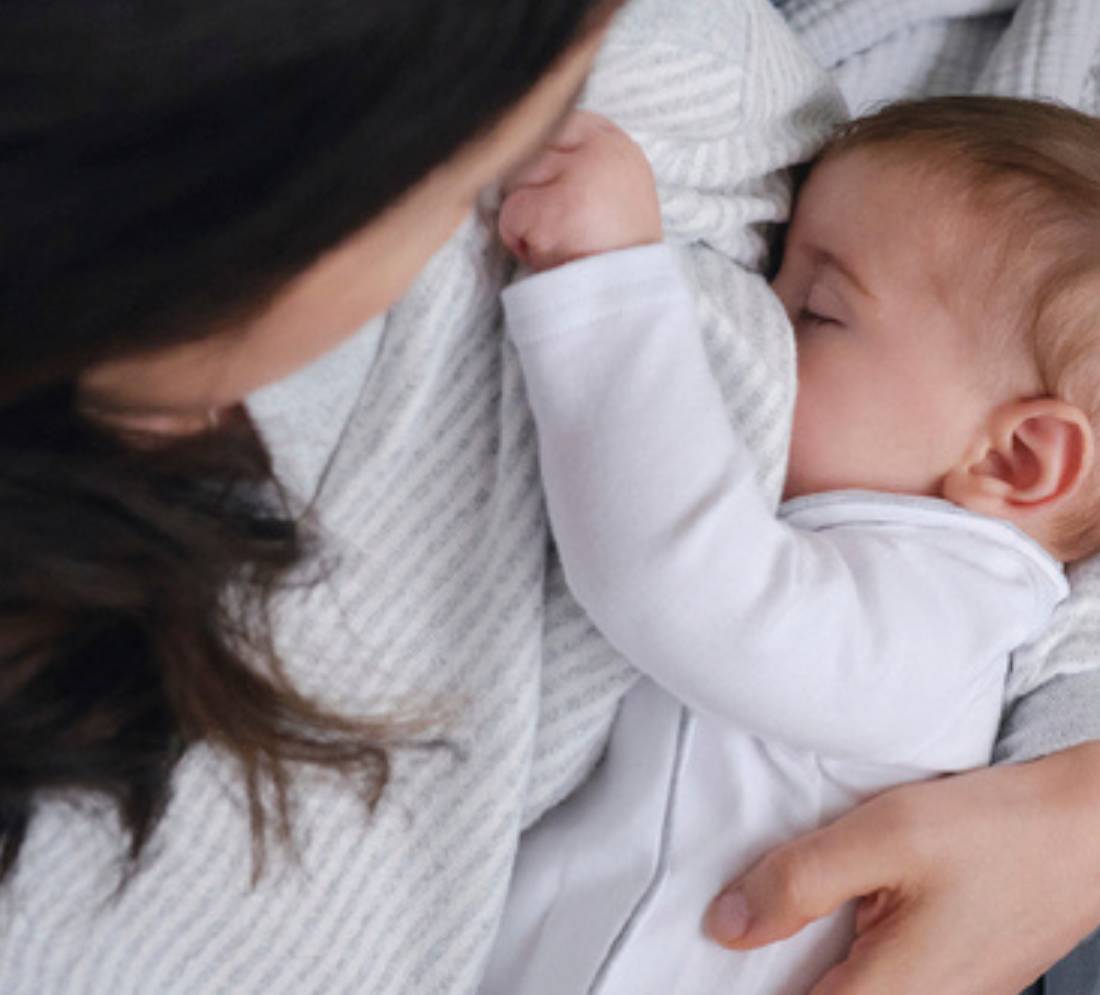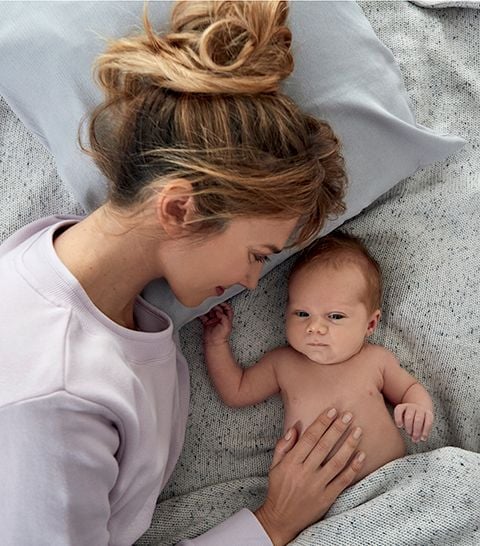
Breastfeeding and Sleep: Let’s Gently Explore the Link
Both breastfeeding and sleep are emotive topics: tender and personal, often tangled with expectation, fear and fierce love.
So, it’s no wonder that when the two overlap, the questions come flooding in: Is breastfeeding the reason my baby wakes so often? Should I stop to help them sleep better? Will they ever sleep through the night?
The truth is this: breastfeeding and sleep can coexist beautifully. And the journey doesn't have to be one or the other. Let’s dive a little deeper.

Busting the Myth: Do Breastfed Babies Just Not Sleep?
It’s one of the most common worries we hear via our DM’s: “My baby’s breastfed, so sleep just isn’t going to happen, right?” But research tells a different story.
A comprehensive 2023 review across 35 studies found that while breastfed babies may wake more frequently, the total amount of sleep for both them and their mothers is the same as that of formula-fed families.
Here’s what to know:
- Breastfed babies often have shorter, more frequent wakings. But they tend to settle more easily back to sleep.
- Breastfeeding mothers often fall back to sleep more quickly, thanks to calming hormones like oxytocin and prolactin.
- By 6–9 months, these small differences typically fade altogether.
So, while the early months may bring more wakeups, it doesn’t mean your baby is a ‘bad sleeper’. It means they’re following a biological rhythm, and it will evolve.

Breastmilk: More Than Nourishment
Breastmilk isn’t just food. It's a beautifully tailored sleep-support system.
It contains:
- Melatonin (especially at night): supports baby’s circadian rhythm.
- Tryptophan: a calming amino acid that aids in serotonin and melatonin production.
- Cholecystokinin (CCK): a hormone that induces feelings of fullness and drowsiness.
Add to that the magic of skin-to-skin contact: regulating baby’s temperature, heart rate and breathing, helping them feel calm, connected, and ready to rest. Every time your baby breastfeeds, they’re doing more than feeding. They’re grounding themselves in safety. They’re preparing for sleep.

Feeding to Sleep: A Problem or a Superpower?
It’s incredibly common for babies to drift off while feeding. It’s warm, rhythmic, and reassuring. But is it a ‘bad habit’? Not at all. Feeding to sleep is one of the most biologically normal and emotionally nourishing ways for a baby to fall asleep in the first 6 months.
Suckling releases calming hormones, both for you and your baby. The closeness of your skin, your scent, the sound of your heartbeat, it all signals safety. It’s no surprise that babies often fall asleep in this cocoon of connection. This is not a flaw. It’s a design. A beautiful one.
And here's what’s important to know: By around six months of age, your baby has developed the neurological sleep architecture needed to begin sleeping for longer stretches. And from an attachment perspective, the love, connection, and trust you've built through responsive care have laid the foundation for them to feel safe enough to do so. With your continued support, and one- or two-night feeds, many babies can begin to settle more independently when they're ready.
If your baby starts to struggle with linking sleep cycles, or you find they’re relying on feeding every time they stir, it doesn’t mean you’ve done anything wrong. It may simply be time to broaden their sleep comfort cues.
Try gently layering in:
- A soft, consistent wind-down routine
- A comforter or familiar scent
- Reassurance from another caregiver
- Rocking, patting, white noise or humming
- Offering the breast as one of many tools, rather than the only one
You’re not removing the breast; you’re expanding the ways your baby feels safe enough to fall asleep. You’re gently helping them discover that sleep can be found in many arms, in many forms, not just one.
True self-settling isn’t about leaving babies to cry. It’s about lovingly guiding them toward sleep while remaining connected and responsive. It’s about holding the space, not always the baby, and trusting that their growing independence is not a rejection, but a reflection of the secure bond you’ve built.
So, if your baby has always fed to sleep and now you feel ready to make some gentle changes, know this: you’re not undoing something precious. You’re simply evolving it.

Gentle Sleep Support That Respects Breastfeeding
There is no need to choose between feeding and sleep. You can nurture both, gently, responsively, and with love. Some foundations that can help:
Full Feeds in the Day
Encourage deep, active feeding during daylight hours to reduce overnight hunger.
Wind-Down Routines
Try breastfeeding → bath → song → cuddle → sleep. A mix of cues builds flexibility.
Watch Nap Gaps (Awake Windows)
Avoid overtiredness by noticing sleepy cues rather than sticking to a strict time schedule.
Dream Feeds
Beyond 4 months, a gentle feed around 10pm-11pm can help extend those first nighttime stretches.
Responsive Sleep Teaching
From 5–6 months, some families explore gentle teaching methods that support independent sleep without sacrificing connection.
It’s not about rigid rules. It’s about honouring what works for your baby and your family.

When to Reach Out for Support
Sometimes, despite love, effort, and all the right information, sleep still feels overwhelming. If any of the following feel familiar, it may be time to reach out:
- Your baby wakes every hour and struggles to settle
- Breastfeeding feels physically or emotionally unsustainable
- You’re feeling burnt out, anxious, or unsure where to begin
- Your baby isn’t gaining weight or seems constantly unsettled
Support doesn’t mean you’ve failed. It means you’re ready to be held too. If you reach a point where you feel you need some help, trust yourself in choosing someone who truly aligns with your values. Whether it’s a lactation consultant, a sleep specialist, or a trusted paediatrician, remember, they are there to support you, not to pressure or override you.
You are the expert in your baby. No one knows them like you do. And any support you seek should feel like a partnership, not a prescription.
In Closing: From Silence to Support
Breastfeeding and sleep are two of the most emotionally charged aspects of parenthood. And too often, we’re left to figure them out alone but you were never meant to do this unsupported.
This World Breastfeeding Week, as we focus on creating sustainable systems of care, let’s remember:
- You don’t have to choose between feeding and sleep.
- You don’t have to follow rigid rules.
- You don’t have to do this alone.
Whether your baby sleeps five minutes or five hours, whether you breastfeed for five days or five years, you are extraordinary.




















